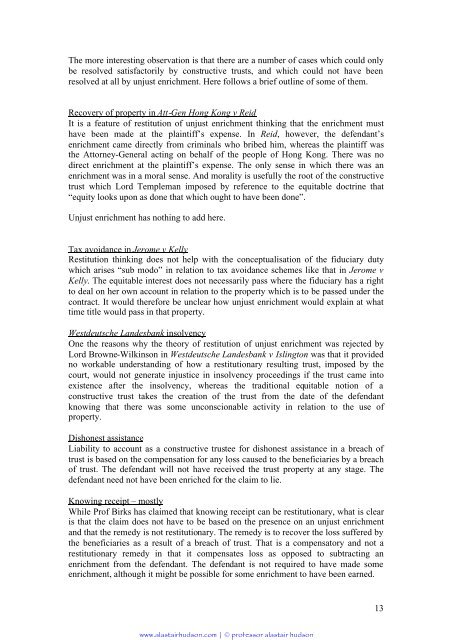England's dreaming equity, trust and conscience - alastairhudson.com
England's dreaming equity, trust and conscience - alastairhudson.com
England's dreaming equity, trust and conscience - alastairhudson.com
You also want an ePaper? Increase the reach of your titles
YUMPU automatically turns print PDFs into web optimized ePapers that Google loves.
The more interesting observation is that there are a number of cases which could onlybe resolved satisfactorily by constructive <strong>trust</strong>s, <strong>and</strong> which could not have beenresolved at all by unjust enrichment. Here follows a brief outline of some of them.Recovery of property in Att-Gen Hong Kong v ReidIt is a feature of restitution of unjust enrichment thinking that the enrichment musthave been made at the plaintiff’s expense. In Reid, however, the defendant’senrichment came directly from criminals who bribed him, whereas the plaintiff wasthe Attorney-General acting on behalf of the people of Hong Kong. There was nodirect enrichment at the plaintiff’s expense. The only sense in which there was anenrichment was in a moral sense. And morality is usefully the root of the constructive<strong>trust</strong> which Lord Templeman imposed by reference to the equitable doctrine that“<strong>equity</strong> looks upon as done that which ought to have been done”.Unjust enrichment has nothing to add here.Tax avoidance in Jerome v KellyRestitution thinking does not help with the conceptualisation of the fiduciary dutywhich arises “sub modo” in relation to tax avoidance schemes like that in Jerome vKelly. The equitable interest does not necessarily pass where the fiduciary has a rightto deal on her own account in relation to the property which is to be passed under thecontract. It would therefore be unclear how unjust enrichment would explain at whattime title would pass in that property.Westdeutsche L<strong>and</strong>esbank insolvencyOne the reasons why the theory of restitution of unjust enrichment was rejected byLord Browne-Wilkinson in Westdeutsche L<strong>and</strong>esbank v Islington was that it providedno workable underst<strong>and</strong>ing of how a restitutionary resulting <strong>trust</strong>, imposed by thecourt, would not generate injustice in insolvency proceedings if the <strong>trust</strong> came intoexistence after the insolvency, whereas the traditional equitable notion of aconstructive <strong>trust</strong> takes the creation of the <strong>trust</strong> from the date of the defendantknowing that there was some unconscionable activity in relation to the use ofproperty.Dishonest assistanceLiability to account as a constructive <strong>trust</strong>ee for dishonest assistance in a breach of<strong>trust</strong> is based on the <strong>com</strong>pensation for any loss caused to the beneficiaries by a breachof <strong>trust</strong>. The defendant will not have received the <strong>trust</strong> property at any stage. Thedefendant need not have been enriched for the claim to lie.Knowing receipt – mostlyWhile Prof Birks has claimed that knowing receipt can be restitutionary, what is clearis that the claim does not have to be based on the presence on an unjust enrichment<strong>and</strong> that the remedy is not restitutionary. The remedy is to recover the loss suffered bythe beneficiaries as a result of a breach of <strong>trust</strong>. That is a <strong>com</strong>pensatory <strong>and</strong> not arestitutionary remedy in that it <strong>com</strong>pensates loss as opposed to subtracting anenrichment from the defendant. The defendant is not required to have made someenrichment, although it might be possible for some enrichment to have been earned.13www.<strong>alastairhudson</strong>.<strong>com</strong> | © professor alastair hudson













